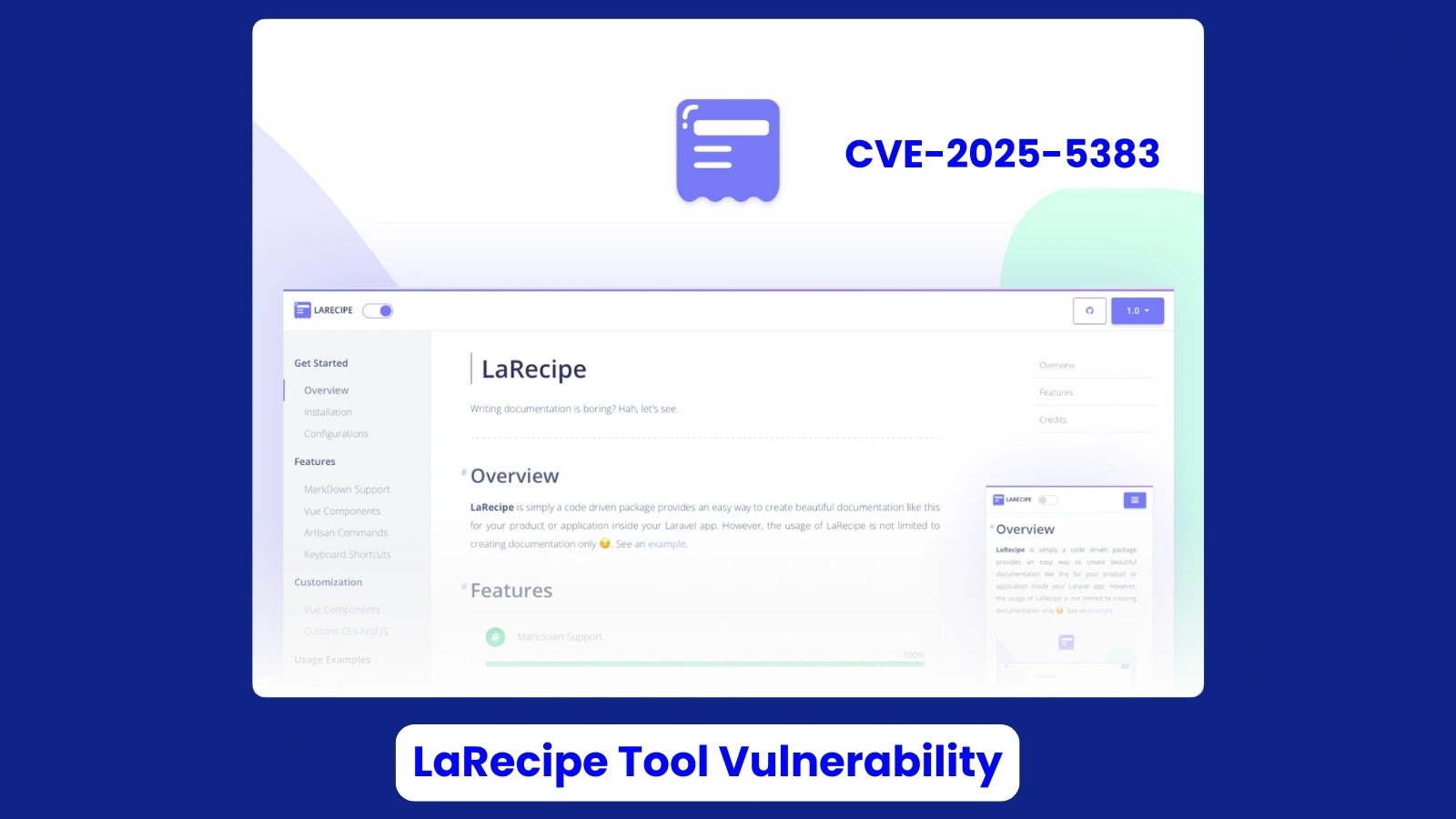A critical security vulnerability has been identified in LaRecipe, a widely-used documentation tool for Laravel applications, potentially exposing millions of web applications to severe risks. This flaw, designated as CVE-2025-53833, has been assigned a maximum severity score of 10.0 on the Common Vulnerability Scoring System (CVSS), indicating its critical nature.
Understanding LaRecipe and Its Popularity
LaRecipe is a Laravel package that enables developers to create in-application documentation using Markdown. Its seamless integration with Laravel’s ecosystem, support for version control, and customizable themes have made it a favored choice among developers. With over 2.3 million downloads, LaRecipe’s widespread adoption underscores its significance in the Laravel community.
Details of the Vulnerability
The vulnerability in question is a Server-Side Template Injection (SSTI) flaw. SSTI vulnerabilities occur when user input is improperly handled within server-side templates, allowing attackers to inject malicious code. In the case of LaRecipe, this flaw can lead to Remote Code Execution (RCE), granting attackers the ability to execute arbitrary commands on the server hosting the vulnerable application.
Potential Impacts
Exploitation of this vulnerability can have several severe consequences:
– Arbitrary Command Execution: Attackers can run any command on the affected server, potentially leading to data theft, unauthorized data modification, or further system compromise.
– Access to Sensitive Information: Malicious actors may retrieve sensitive environment variables, including database credentials, API keys, and other confidential data.
– Privilege Escalation: Depending on the server’s configuration, attackers might escalate their privileges, gaining deeper access to the system and its resources.
Affected Versions
All versions of LaRecipe prior to 2.8.1 are susceptible to this vulnerability. This includes all releases in the 1.x and 2.x series up to version 2.8.0.
Mitigation Measures
To address this critical issue, the maintainers of LaRecipe have released version 2.8.1, which contains the necessary patches to fix the SSTI vulnerability. Users are strongly advised to upgrade to this latest version immediately to secure their applications.
Steps to Upgrade:
1. Backup Your Application: Before making any changes, ensure you have a complete backup of your application and its database.
2. Update Composer Dependencies: Run the following command to update LaRecipe to the latest version:
“`bash
composer update binarytorch/larecipe
“`
3. Clear Cached Configurations: After updating, clear any cached configurations to ensure the changes take effect:
“`bash
php artisan config:clear
php artisan cache:clear
“`
4. Test Your Application: Thoroughly test your application to confirm that the update has been applied successfully and that all functionalities are operating as expected.
Additional Security Recommendations
Beyond updating to the latest version, consider implementing the following security best practices to further protect your Laravel applications:
– Input Validation and Sanitization: Ensure that all user inputs are properly validated and sanitized to prevent injection attacks.
– Regular Security Audits: Conduct periodic security assessments of your application to identify and address potential vulnerabilities.
– Environment Variable Management: Store sensitive information securely and limit access to environment variables to only those components that require it.
– Access Controls: Implement strict access controls and least privilege principles to minimize the potential impact of a security breach.
Conclusion
The discovery of CVE-2025-53833 in LaRecipe serves as a stark reminder of the importance of proactive security measures in software development. Given the critical severity of this vulnerability and the widespread use of LaRecipe, immediate action is essential. By promptly updating to version 2.8.1 and adhering to robust security practices, developers can safeguard their applications against potential exploits and maintain the trust of their users.



